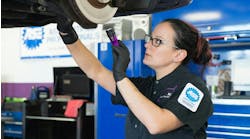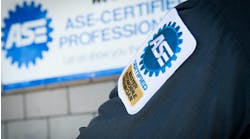What’s the difference between a technician and a mechanic?
The role of an individual who services and maintains commercial vehicles has shifted significantly over the last several years, as has their title.
While some will use both mechanic and technician interchangeably, there are notable distinctions between the two. According to experts at TechForce Foundation, a non-profit organization focused on recruiting and supporting the vehicle service workforce, “Technicians are all about critical thinking, focus, attention to detail, and using deductive reasoning to ‘put the pieces together’ in a strategic approach to their work. Whereas mechanics are thought mostly to be doing physical work. As the industry has evolved, it is revealed how inadequate the term ‘mechanic’ really is in describing all that today’s techs do.”
“When I was younger and cars were more mechanical, ‘mechanic’ was truly the term,” notes George Arrants, vice president of the ASE Education Foundation. “But today with all of the technology, technicians are doing more research and diagnostics.”
A technician’s role involves exactly what the name suggests – a more technical focus requiring comprehensive training and utilizing complex tools to diagnose and repair vehicle issues. Examples of vehicle complexity today’s technicians are tasked with include driveability concerns, electrical system diagnosis, pinpointing various vehicle computer system issues, and more.
“‘Mechanic’ is just a term that we all grew up knowing because we were doing mechanical things,” suggests Arrants. “But then as vehicles evolved, the terms ‘technology’ and ‘technician’ came more into play.” Arrants advises that regardless of level of expertise in the shop – from entry-level technician to master-level technician, all shop service technicians include the distinct “technician” in the title.
Why make the distinction?
It more frequently happens outside of the commercial vehicle maintenance world that I hear the term "mechanic." Let me be clear, for those who call themselves a mechanic by trade: While there is nothing inherently wrong with the title of “mechanic,” I believe it's time we recognize the distinct differences in job responsibilities for the two titles. A technician title more aptly defines the full scope of skill set and training necessary for the individuals servicing heavy duty vehicles today.
While it may seem like a simple change, removing the “mechanic” title in exchange for “technician” can reinforce a positive view of the career and the industry for those not intimately familiar with the job requirements.
Recruitment for a highly engaging and technical field is critical, and those students completing professional coursework and degrees to obtain service technician certification should be given the respect they deserve for having the knowledge to service the vehicles on the road today.
Today’s generation entering the workforce grew up understanding how to use technology such as smart phones and tablets from a very young age, not only for gaming and socializing but also as part of their process for communicating with everyone and learning about everything. Due to the inherent nature of today’s entry-level technicians’ native technological capabilities, they have a developed acumen to better understand how technology operates and its applications. This naturally translates to understanding the complexity and computer systems on commercial vehicles, as well as the sophisticated technology used to diagnose and repair such systems.
This isn’t to say additional training on electrical systems, scan tool usage, and comprehensive training of vehicle systems isn’t necessary. And it certainly doesn’t mean an entry-level technician won’t get their hands dirty completing preventive maintenance inspections, doing oil changes, or replacing brake lining. But, overall, the skill set of today’s technician is more nuanced and requires a higher level of expertise to perform mechanical hands-on tasks as well as diagnose and troubleshoot vehicle computer issues. They are often required to utilize diagnostic tools such as scan tools, digital multimeters, and oscilloscopes, plus navigate where to find supporting repair information, wiring diagrams, and more.
TechForce experts provide the example of rebuilding a transmission in today’s vehicles: “Consider the detailed knowledge and ability to perform precise measurements needed to assemble an engine. With the complexity of today’s vehicles, even the most mechanical tasks require a deeper understanding than ever before.”
“In my opinion, if you're going to work in the transportation environment, unless you are a specialist at one thing and one thing only – you know disassembly and reassembly – you are a technician, not a mechanic,” says Arrants. “Those people who use the term ‘mechanic’ are uneducated to the occupation.”
Ultimately, many on the maintenance side of the business already call their staff by their proper technician titles. To encourage the status earned by this level of vehicle servicer, it is critical we call out and course correct the outdated “mechanic” title.




